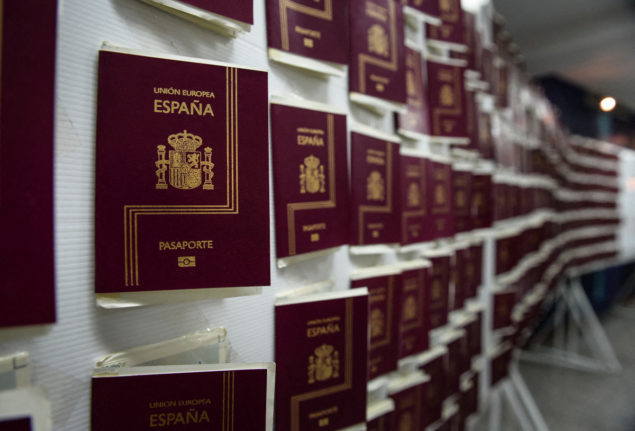Spain has yet another sports star to celebrate, but technically speaking he’s not even Spanish… yet.
Mixed martial artist Ilia Topuria won the featherweight title at Ultimate Fighting Championship (UFC) 289 in Anaheim, California, on February 17th, taking the belt from Australian Alexander Volkanovski.
But when the fighter made his triumphant return to Madrid after the bout, the new championship belt proudly slung over his shoulder, he was forced to go through immigration like any other foreigner arriving in Spain.
“When I landed, I thought why did I have to go through immigration, where the foreigners go and not where the Spaniards go?” Topuria later said.
Topuria’s ring walks are known for bearing two flags: one Georgian, where his parents are from, and one Spanish, the country where he has lived since he was 15 years old.
But the fighter, who defines himself as a Spanish-Georgian, is not Spanish legally speaking.
Esta mañana he recibido a @Topuriailia, el nuevo campeón mundial de peso pluma de la @ufc.
Tu esfuerzo, dedicación y perseverancia te han llevado a cumplir uno de tus sueños.
El segundo también se hará muy pronto realidad. Tu amor por España se reflejará en tu DNI español. pic.twitter.com/weeTTnCewd
— Pedro Sánchez (@sanchezcastejon) February 27, 2024
Not until now, anyway. Upon his return to Spain, Topuria revealed that his next aim isn’t more success in the octagon but to get Spanish citizenship. “My dream? To have a Spanish ID card,” he said while appearing on the Spanish TV chat show El Hormiguero on Monday.
Topuria was welcomed at La Moncloa by Prime Minister Pedro Sánchez on Tuesday, after admitting he’d considered going straight to the top with his request: “Tomorrow I’m going to ask the President in person, to see if he can help me…” he said.
Topuria has also previously said that Sánchez was yet to congratulate him after becoming champion. “I have not been congratulated by the leader of our country. It hurt me, but I don’t hold grudges,” he argued.
However, Sánchez tweeted on Tuesday via X that “your love for Spain will be reflected on your Spanish ID”, confirming that Topuria’s request hasn’t fallen on deaf ears.
Of course, Topuria (27) could have already acquired Spanish nationality as he has been living in Spain since he was 15 years old, and therefore meets the legal requirements to obtain it, but to become Spanish he would have to renounce his Georgian nationality.
Georgia is not a Schengen area country, the reason why the UFC champion had to go through extra non-EU immigration checks upon his triumphant return to Barajas airport.

Ilia Topuria was born in January 1997, not in Spain or Georgia but in Halle, Germany. When he was six years old, the Topuria family returned to Georgia and he lived there until he was 15 years old. It was then that he came to Spain, to Alicante, and began focusing on mixed martial arts training.
The fighter has long been clear about his dual-identity and pride in being Spanish. “I feel very Spanish and I also feel very Georgian. It’s like having two sons. When they ask me, ‘Georgia or Spain? You can’t choose between two children, you love them both equally. My parents come from Georgia, my blood is Georgian, but I have grown up in Spain,” the featherweight fighter has previously said.
Given Spain’s past leniency in handing out Spanish citizenship to sports stars is anything to go by, Topuria is more than qualified.
Over the years there has been a trend in sports stars getting citizenship due to their sporting prowess alone, something known as ‘express citizenship’, including football stars Lionel Messi and US basketball player Lorenzo Brown, who, having never lived in Spain, was granted Spanish citizenship immediately just so he could play for the national team.
In Topuria’s case, his claim seems much fairer as he has lived in Spain for many years, speaks Spanish to a native level, and self-identifies as Spanish-Georgian.
Whether or not the Georgian authorities will be so flexible with their own citizenship rules when it comes to granting him dual nationality, however, remains to be seen.
READ ALSO: How foreigners can get fast-track citizenship in Spain
Most ‘express citizenship’ applications in Spain are done via a carta de naturaleza, as it’s called in Spanish, which allows foreign nationals who have done something “exceptional” for Spain to become Spanish citizens immediately, with the waiting times that all other applicants have to endure also non-existent.
Critics say this fast-track citizenship option is an elitist privilege and unobtainable unless you have friends in high places in the Spanish government, as it is awarded by Royal Decree by Spain’s Council of Ministers.
READ ALSO:



 Please whitelist us to continue reading.
Please whitelist us to continue reading.
Member comments